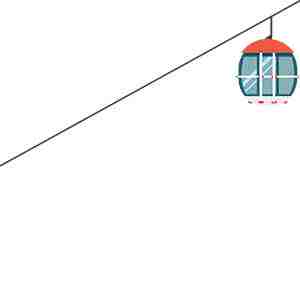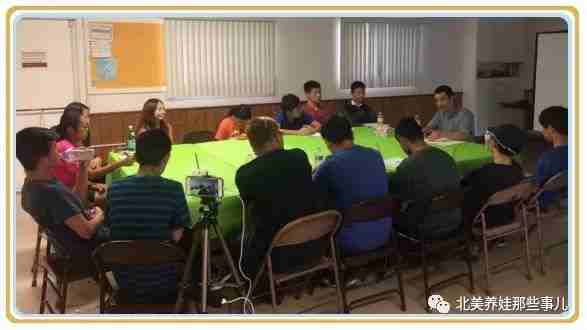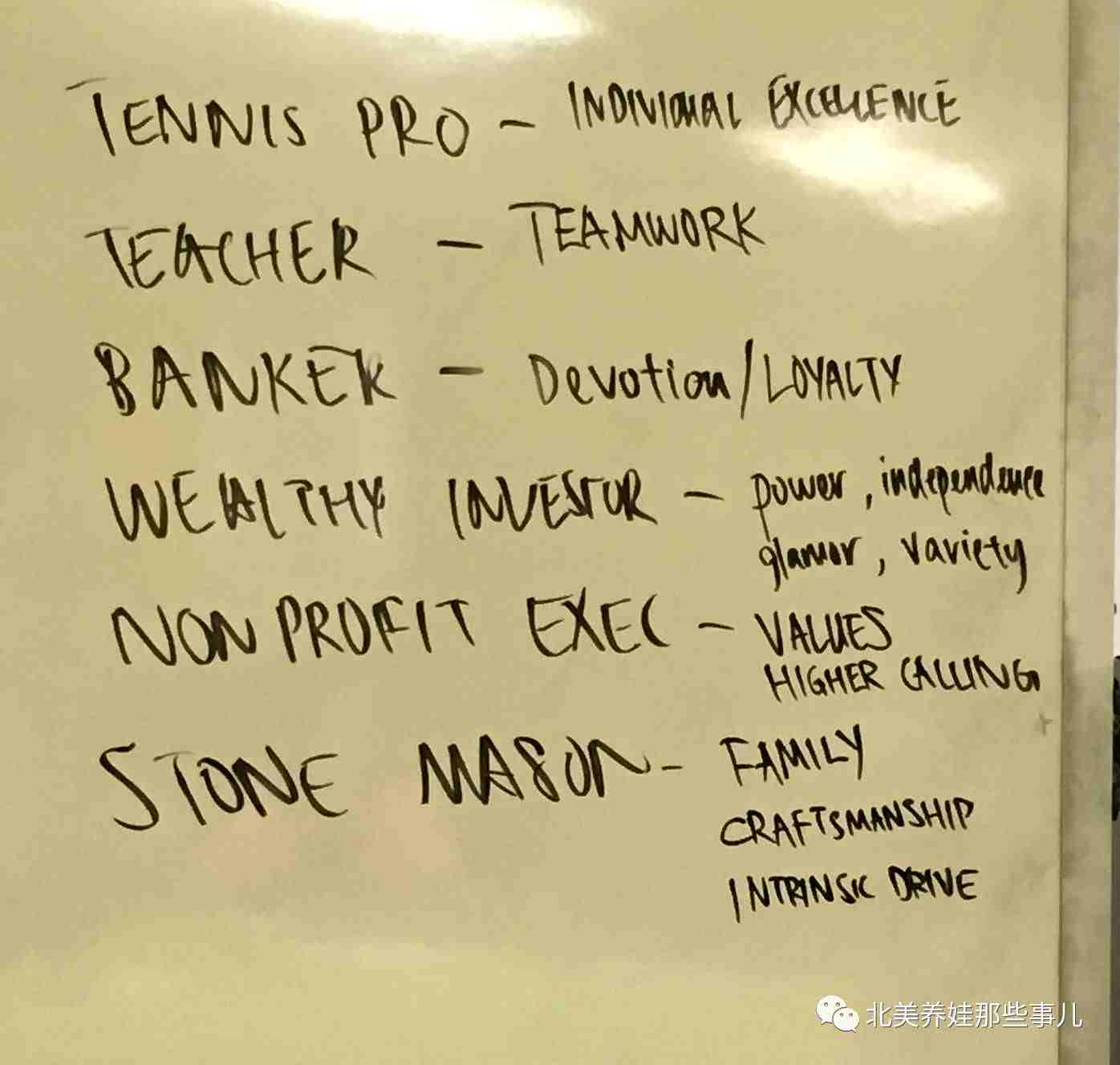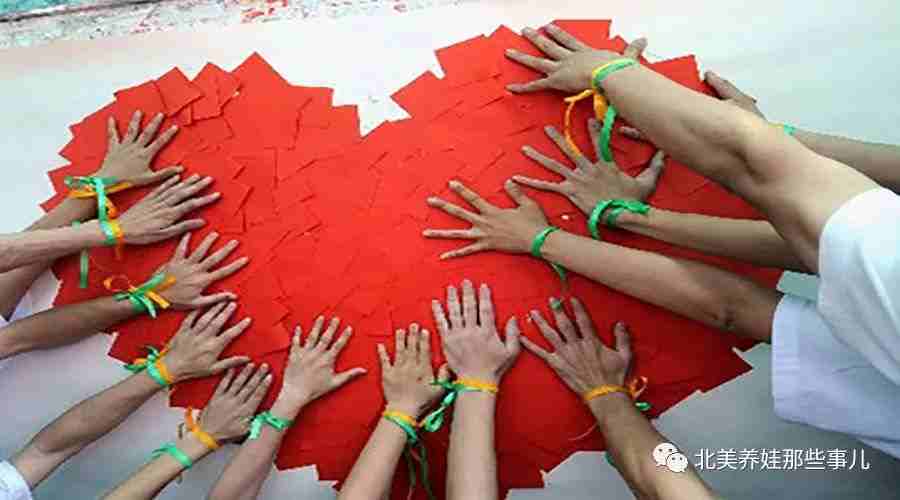Orenda辅导青少年第三周:六种人生,你来评分



编者按:
美国硅谷Orenda Academy
年轻人传帮带,辅导青少年
“我们年轻时,有过叛逆,困惑。现在回头看,我们多么希望当时有个大哥哥大姐姐来引导我们,疏导我们。我们渡过了那个时期,认识到辅导青少年是一个很值得做的事情。”
“湾区有很多升学辅导,课后补习班,这些活动教孩子什么(What),如何做(How)。这些技巧当然重要,但我们觉得,让孩子明白为什么(Why)更重要。从根本上把问题解决了,孩子的动力就来了。”
Orenda活动文章分享:
1. 阿朵:儿子的周末不属于我
2.儿子,你们和学生们谈人生终点?好大的胆!Orenda辅导青少年第三周
1.
“妈妈,我的文章写完了,你能提提意见吗?”这是当老师的大儿子最近常给我发的信息。他把文章分享到谷歌的文件里,我,先生,老二都可以读。
我呢,每次读第一遍,都不能一下子就领会文章的内容。他用的概念,方法,人物,书,对我来说,很多都不熟悉 ,这意见还真不好提。
比如,上次他们讲的是美国作家David Brooks的书 “The Road of Character”中提出的两种美德 --工作中用的“简历美德”和人的葬礼上被怀念的“品格美德”。这个概念,我还真是第一次听说。尽管琢磨半天,其实还真是这么回事,但落实到文字里看到,还是很震撼。
2.
这一次,他们用的是由美国的宾夕法尼亚大学商学院教授Professor Richard Shell为他的研究生准备的课程“六种人生”。咋一读起来,还真觉得有那么一点“高深”。
只是我读了老大的总结性文章之后,觉得有点不过瘾,就自己到网上找了Richard Shell的原文。仔细想了想,开始消化 ,开始领会,觉得人生还真是有意思,横看成岭侧成峰,各有千秋,就看你喜欢什么样的生活。
其实读老大的文章的过程,对我来说,也是一个刺激的过程,学习的过程,成长的过程。 我始终在想,如果我年轻时就知道这些事,这些概念,这些道理,那我的人生会不会有些不一样?
可惜人生没有如果。
3.
所幸的是,他们这几个热衷教育的年轻人,年轻时就思考,就介入,就把道理讲给他们辅导的12-16岁的学生听,我从心里佩服他们年轻人这股子热情。
种子发芽需要一个过程,需要有阳光,土壤,水分。衷心地希望这些初高中生们,能汲取其中的养份,为他们将来要扬帆起航找到方向。
翻译和原文如下:

Orenda辅导第三周:六种人生,你评分

翻译:阿朵 / 原文:Carl Shan
Orenda活动第三周:我们的核心价值观是什么?
在我们上次辅导Orenden学生的活动中,我们让他们问自己一些重要的问题:你们想过什么样的生活?你们想当什么样的人?学生们谈了哪些事情让他们感到幸福,有干劲,哪些事情对他们自己来说是最重要的。
在上次讨论的基础上,这周我们给学生举具体的列子。这六个列子里每个人都有自己不同的价值观,所以他们的人生也不一样。我们希望学生能根据自己的价值观,把这六个人排序。

价值观
价值观是什么呢?
为了我们做事有自己的内在动力,我们需要知道我们自己要什么。如果我们自己都不知道什么对我们来说是最重要的话,那我们就好像一只没有导航的船,在大海上随意漂流。
对很多人来说,价值观对他们来说是很重要的。在这次的活动中,我们给学生准备了“六种人生”的练习。这著名的“六种人生”练习,是由美国著名的宾夕法尼亚大学商学院教授Professor Richard Shell 为他的研究生准备的课程,目的是为了让他的学生更好地了解他们自己,知道他们想要什么样的生活。
我们把这个方法练习,借鉴拿来和我们Orenda的学生分享,帮助引导他们理清他们自己最在乎的是什么。

六种人生
“六种人生”活动,我们先让学生们读六个不同的人物资料,这六个人物都有自己不同的专业,不同的领域,不同的人生故事。
帕特 Patricia Kelly,教授物理,并在郊区高中担任女子(14-18岁的孩子)足球主教练。她先生管理着30年前他们创立的家族连锁零售店。帕特在过去五年中,率领她们 学校的“科学奥林匹克”队三次获得区域锦标赛冠军和一次全国冠军。在帕特的指导下,她的很多学生被美国顶尖理工大学如美国麻省理工学院和加州理工学院等录取。
帕特有两个女儿,其中一个获得物理学博士学位。 现在正在一家高科技公司工作。而另一个却在高中麻烦不断,高中从未毕业,住在遥远的城市。家人试图和她保持各种联络,都被她拒绝。
彼得是一名私人股权投资者,他在伦敦,纽约和百慕大自己别墅之间平衡着他大部分的单身生活(他有过一次婚姻,但在四年后离婚)。他的第一笔财富是通过早期创业互联网公司,然后将其卖给一个大型的竞争对手,他的24万美元的投资变成了5000万美元傲人的回报。
从那以后,一切都是“顺风顺水”的。一家著名的商业杂志最近发表了一篇关于彼得的封面故事,说他是一个公认的自由思想家和自由主义者。他在文章中说:“我喜欢大赌注带来的的兴奋,我看到了这个回报。”
彼得工作之余喜欢到各个遥远的地方去Party(“I like to work hardand play hard”),崇尚独立,自由(“being in the air alone gives me a sense of freedom”)。他慷慨地捐助他所相信的政治事业,并和全球有影响力的政治家就全球经济进行磋商。
Janice Chung是一名勤奋的职业网球运动员,曾在过去十年中七次赢过四项重大比赛,名列全国前十五名。她五岁开始和她父亲打网球,由于她父亲坚持不懈地带她练习,她比赛成绩都很好。自那时以来,网球在她的生活中一直占主导地位。
几年前,她创立了Chung网球协会,该协会为生活在贫穷城市社区的年轻女性提供免费网球教学和“生活技能训练”。
她和一名房地产开发商结了婚,但他们不能自己生育,现在已经收养了三名年龄在2岁, 6岁和7岁的韩国孩子。
“网球生涯是很艰难的”,她最近告诉网球杂志: “你不会有很多时间和孩子相处。”
石匠弗雷德·汉普郡是一名普通石匠,他生活在一个大城市附近。他对历史建筑设计充满激情和学习的热情。他和妻子玛丽已经结婚了52年,他们有三个孩子(一个律师,一个银行家和一个家庭主妇)和七个子孙。
“你接过的每块石头都不一样,”他曾经告诉记者。 “在我的工作中,我可以看到我开始的第一天做了什么,几年后回去,我的工作成果还在那里。铺砖或石头是美好的一天的开始,虽然很辛苦,但是你在搭建一个建筑,很有成就感。“
汉普郡承认,他不富有,有的时候为钱困扰。但让他引以自豪的是,他三个孩子的房子都是他帮着建的。
珍妮·里夫在一个大城市的跨国银行工作,在这个大城市,她已经从银行职员升格成为财富管理服务的区域副总裁,她对雇主和客户都非常忠诚。
珍妮是一个马拉松运动员和一个单身母亲,她把她的业余时间分给了健身训练和她的子孩朱莉。朱莉患有严重的学习障碍并有身体残疾,朋友和家人都建议珍妮为朱莉找一个社会服务机构照顾孩子,这样她就可以“继续过她自己的生活”。但珍妮回答说:“朱莉是我生活的一部分- 我永远不会想让任何人接管照顾她。”
去年,珍妮用一个特别装备的轮车着推朱莉跑纽约马拉松, 这获得了一个残疾儿童国际新闻电视节目的报道。
过去几年,珍妮和几个男人约会过,但她不相信婚姻,部分原因是她自己的父母婚姻就不幸福。
保尔森先生曾经是一个大城市出色的富豪投资顾问,他以管理复杂房地产的能力而闻名。他已经和妻子特里(一名儿童发展顾问)结婚20年,他们有四个孩子。比尔在他的办公室被认为是“最有效率的人”,挣得比任何人都多。
但五年前,比尔辞职,薪金大幅缩减,成为由南非魅力十足的宗教领袖创立的一个快速发展的非营利组织服务机构的高级管理人员。比尔告诉当地的报纸说:“我听到了上帝的呼唤。” 比尔的主要工作是帮助执行该组织的“国际使命”, 帮助非洲农村获得清洁用水。比尔组织了一个宗教慈善团体来资助这项工作,他的投资技能使得迄今为止他们筹集到的资金的价值翻了一番。
他们计划在接下来的两年里,到一个贫穷的非洲国家地区去生活和工作,在这个国家,他们将经营管理由联合资助的水项目。比尔和特里的孩子年龄在8岁到16岁之间,孩子们都不想去非洲。但是,比尔和特里决心整个家庭一起行动。

打分
看完这些人的简历,你是不是看到,这些人物都有成功的一面,但也有缺憾的一面?人生就是这么不完美。
接下来的练习,我们要求学生们根据自己的理解,对这六个人物进行打分排序:对他们来说,哪个是最成功的,哪个是最不成功的。
打分之后,学生们之间互相分享他们的结果。很多学生很吃惊地看到,他认为很成功的人物,在其他学生眼里,却是最不成功的。
Orenda的教练进而引导学生们进行讨论:为什么你认为这个人物是最成功的?而那个人物是不成功的?你这样打分的理由是什么?
这里没有标准答案,没有对错。

差距
这项活动的目的是为了让学生们明白什么对他们是最重要的。 理查德(Richard Shell)教授在设计这些人物时,他是有不同的内涵在里面的,不同的人物其实是代表了各种不同角度的“成功”。
例如,老师代表一个致力于团队协作和指导生活的人;富有的投资者代表权力,名望,地位和自由;非营利机构董事强调了精神或更高层次追求的重要性;网球运动员代表了个人的卓越;银行家代表忠诚和奉献;石匠代表了家庭等。

学生们在理解了不同人物代表了不同层次的成功之后,开始思考希望自己当哪一类人物。我们的教练开始进一步引导学生,问他们现在的生活是否和他们的希望的成功一致,学生们写下哪些方面一致,哪些方面不一致。
接下来就是小组讨论,学生们纷纷打开心菲,互相分享。我们一起分析那些不一致的差距在哪里,还要付出哪些努力才行。

下周
我们的主题活动都是一环扣一环的。这一周我们让学生们看到了差距,下一周,我们将基于这个主题,主要讨论学生们的行动和习惯:为了达到他们的理想目标, 他们应该建立怎样的习惯。
我们也将介绍斯坦福心理学教授BJ Fogg对于人们如何形成习惯的研究,我们将帮助每个学生找到一种可以建立的习惯,以减少他们的价值观与生活之间的“差距”。
许多学生告诉我们说他们非常喜欢我们的“六种人生”的活动,他们说通过这个活动, 他们了解了他们自己以前未曾想过,但非常关注的内容。
我们希望学生们可以把这些思考付诸在行动上,这是Orenda帮助学生的目标之一。

想参加吗?
我们目前辅导的学生名额已满,如果你对2018年的辅导课程感兴趣,请填写调查表:
https://docs.google.com/forms/d/e/1FAIpQLScCvg-kFPZ2HFXrYzkz0cX7I5TwJUwHAK9dWf7ll0uA7UQeBw/viewform
我们也有少量online异地辅导名额,感兴趣者请寄邮件:[email protected]


英文原文
Orenda Week 3 What are My Core Values?
September 25, 2017
|
Carl Shan
During Orenda’s last groupsession, we asked students to dive into some of the most important questionsthey could ask themselves: what kind of life do they want to live? And whatsort of person do they want to be? Students also verbalized what made them feelhappy, motivated and defined, as well as described and defended what things aremost important to them.
Building on top of thediscussion from last week, this week we helped students explore examples ofpeople who live according to different sets of values. We helped studentsprioritize their lives according to their own values.

What do we value?
In order to have power andcontrol over our own lives, we need to know what we want. When we try to liveour lives without knowing what’s important to us, we are like ships sailing onan ocean without a guiding compass to point us in the right direction.
For many people, their valuesare the most important to them. In this week’s workshop, we asked students toidentify their core values by working through an exercise we prepared for them.This famous exercise is known as the 6 Lives Exercise and was created by Professor Richard Shell at the University of Pennsylvania to help his graduatestudents better understand themselves and the life they wanted to create.
We adapted this activity for our Orenda students and guided them through it, helping them refine their corevalues.
The 6 Lives Activity
The 6 Lives activity starts bygiving each student six different paragraphs of fictional people. Eachparagraph describes the life of a different professional. For example, oneparagraph describes a teacher who has a fulfilling 20-year career as aneducator. She leads her science bowl team to championships and mentors multipleaspiring scientists; however she is estranged from one of her two daughters.Another profile describes a high-powered wealthy investor who “parties hard andplays hard” and has enough power and wealth to influence powerful figures.However, he is divorced and has no children. Yet another profile summarizes thelife of an highly successful investment advisor who, in his 50s, quits his jobto take on a role at a nonprofit service organization in Africa because he nowhopes to commit his life to impact.
TEACHER. PatriciaKelly teaches physics and serves as head coach of women’s track at a suburbanhigh school (children ages 14-18). Her spouse manages a chain of retailstores the spouse’s family founded 30 years ago. Pat has led her school’s“Science Olympics” teams to three regional championships and one National titleover the past five years. Under Pat’s guidance, the high school hasplaced a number of students in the country’s top scientific universities(places such as MIT and Cal Tech in the U.S.). Pat has two daughters, oneof whom earned a Ph.D. in physics and is now working for a high-techcompany. The other ran into trouble in high school, never graduated, andlives in a distant city. She has rebuffed all attempts by the family tostay in touch with her.
WEALTHY INVESTOR. Peter Tailor is aprivate equity investor who balances his mostly single life (he married oncebut divorced four years later) between homes in London, New York, and Bermuda.He made his first fortune guiding a startup Internet company through its earlystages and then selling it to a large competitor. His $240,000 investment turned into ahandsome payoff of $50 million. It hasbeen all “upside” since then. A leadingbusiness magazine recently published a cover story on Peter, revealing him tobe an avowed free thinker, lover of freedom and committed libertarian. In the article, he said, “I love theexcitement of placing a big bet and seeing it pay off.” His passions outsidethe office include parties in far-flung places (“I like to work hard and playhard”) and hang-gliding (“being in the air alone gives me a sense offreedom”). He donates generously topolitical causes he believes in and is consulted by influential politiciansacross the globe for his opinions regarding the global economy.
TENNIS PRO. Janice Chung is a hard working,professional tennis player who has won four major tournaments in her career andfinished in the top 15 money-winners in seven of the past 10 years. She started playing tennis with her father atthe age of five, and, as a result of the relentless drills her father insistedon, she perfected her game. Tennis hasdominated her life since then. A fewyears ago, she founded the Chung Tennis Institute, a group that provides freetennis instruction and “life skills training” to young women who live in a poorurban neighborhoods. She is married to areal estate developer and, unable to have children herself, has adopted threeKorean kids, now aged 2, 6 and 7. “It’sa tough life on the tennis circuit,” she told a tennis magazine recently. “You don’t get as much time with yourchildren as you would like.”
STONE MASON. Fred Hampshire is a stone mason whohas lived his whole life near a large city. A passionate student of historical architectural design, he has beenmarried to his wife Mary for 52 years and he has three children (a lawyer, abanker and a homemaker) and 7 grandchildren. “Every piece of stone you pick upis different,” he once told a news reporter. “In my work, I can see what I did the first day I started and watch itgrow. And I go back years later and itis still there to see. It’s good daylaying brick or stone. It is hard work,but you get interested in fitting each piece in just its right spot and the dayis over before you know it.” Hampshireadmits that money has sometimes been a problem, but he proudly points out thathe personally helped to build homes for each of his three children.
BANKER. Jane Ruly has worked for her entire careerat a multi-national bank in a large city, where she has risen through the ranksto become a regional vice president for wealth management services. She is fiercely loyal to both her employerand its customer base. Jane is an accomplishedmarathon runner and a single parent who divides her non-working time betweenfitness training and her young child, Julie, who has severe learning andphysical disabilities. Friends andfamily members have encouraged Jane to find an institutional home for Julie soshe can “get on with her life,” but Jane responds that “Julie is my life – Iwould never dream of letting anyone else take over her care.” Last year, Jane ran the New York Marathonpushing Julie in a specially-rigged carriage – a feat that earned her a segmenton an international news television program about parents of children withdisabilities. She has dated several menover the past few years, but she has never believed in marriage – in partbecause her own parents were so unhappy together.
NONPROFIT EXECUTIVE.
Bill Paulson usedto be an award-winning investment advisor for wealthy families in a major city,where he was well known for his ability to manage complex estates. He has been married for 20 years to his wifeTerry (a child development counselor) and they have four children. Bill wasconsidered a “top producer” in his office and earned more than anyone else inhis group. But five years ago, Bill quithis job and took a huge pay cut to become a top administrator at a fast-growingnonprofit service organization founded by a charismatic religious leader fromSouth Africa. “I heard God’s call,” Billtold the local paper, “and I answered.”
Bill’s main project has been help to carry out the group’s“international mission” helping rural African villages secure clean watersupplies. Bill helped to organize acoalition of religious charities to fund this work, and his investment skillshave doubled the investment value of the money raised to date. The family is planning to take next two yearsoff to go live and work in a rural community in an impoverished Africancountry, where they will run one of the coalition-funded water projects. Bill’sand Terry’s kids range in age from 8 to 16, and none of them want to go. But Bill and Terry are determined take theentire family.
Each of these profiles is flawedand imperfect in their own way, though each also has clear strengths.
Students are asked to read eachof these profiles and then rank them one through six in terms of “mostsuccessful” to “least successful.” No ties are allowed.
After Orenda students were donereading and ranking, they shared their number 1 and number 6 rankings with eachother. Some students were surprised to hear what they ranked as their mostsuccessful was someone else’s least, and vice versa. Orenda coaches thenfacilitated discussions between the students around how each student came toconclusions about which profile was the “most successful” and why.
DiscoveringWhat We Value In Life
The purpose of this activity isfor students to highlight for themselves what’s important to them. WhenProfessor Richard Shell came up with this activity, he wrote each profile witha different dimension of “success” in mind. For example, the teacher’s profilerepresents a life devoted to teamwork and mentorship. The wealthy investorrepresents power, fame, status and freedom. The nonprofit executive’s profilehighlighted the importance of following a spiritual or higher calling towardsservice.
After students understood howeach of the profiles they read represented a different aspect of success, theywere asked to then reflect upon whether they live up to their values. With thehelp of Orenda coaches, students wrote down and shared areas in which theirlives aligned and didn’t align with the values they just uncovered. In smallgroups, we then discussed these “authenticity gaps” that students revealedabout themselves, how they felt about them and what they wanted to do aboutthem.
We will build upon this theme ofaligning your actions with your goals next week when we cover the topic tobuilding habits that help you achieve your goals. We will present the researchof Stanford psychology BJ Fogg on how people form habits, and we will help eachstudent find a habit that they can build to close the “authenticity gap”between their values and their lives.
Many students enjoyed our 6 Liveactivity and told us that they learned about what they deeply care about. Wehope students now take these reflections and put them into action, which issomething that Orenda will help with.
Ifyou are interested in learning more about
participatingin Orenda Academy, please fill out this link:
Spring 2018 Interest Form
Weare also holding a limited number of spots for Spring 2018 virtual coachingwhere coaches work online with students located outside of the Bay Area. Pleaseindicate if you are interested. You can also email us at carl[at]orendaacademy.com.
英文原文:
https://www.orendaacademy.com/orenda-blog/2017/09/25/Orenda-Week-3-Core-Values

作者简介:阿朵,生活在美国硅谷的普通码工。大学,研究生学的是都是工科,心里却有一个文学梦。
1997年来到美国,体验着中美两国文化的差异,养育着四个生龙活虎的儿子,也被儿子们锤炼着,教育着,随笔记下生活中和孩子一起成长的点点滴滴。
作品发表在美国《星岛日报》,《侨报》,《美国都市报》,《北京菁Kids》杂志。文章被收集在清华大学出版社出版的海外文轩文集《教育,还可以。。。》《生活,还可以。。。》。
版权归作者所有,转载请联系作者。
阅读更多公众号文章,点击左下角“Read More”。
更多文章,都是原创!
家长分享:

部分照片来自网络。版权归作者所有


《北美养娃那些事儿》
立足硅谷,放眼世界。《北美养娃那些事儿》由北美家长分享养儿育女,申请大学,家长和孩子共同成长的真实故事。
关注《北美养娃那些事儿》, 扫码吧。
欢迎大家一起分享!投稿请寄[email protected]
最新评论
推荐文章
作者最新文章
你可能感兴趣的文章
Copyright Disclaimer: The copyright of contents (including texts, images, videos and audios) posted above belong to the User who shared or the third-party website which the User shared from. If you found your copyright have been infringed, please send a DMCA takedown notice to [email protected]. For more detail of the source, please click on the button "Read Original Post" below. For other communications, please send to [email protected].
版权声明:以上内容为用户推荐收藏至CareerEngine平台,其内容(含文字、图片、视频、音频等)及知识版权均属用户或用户转发自的第三方网站,如涉嫌侵权,请通知[email protected]进行信息删除。如需查看信息来源,请点击“查看原文”。如需洽谈其它事宜,请联系[email protected]。
版权声明:以上内容为用户推荐收藏至CareerEngine平台,其内容(含文字、图片、视频、音频等)及知识版权均属用户或用户转发自的第三方网站,如涉嫌侵权,请通知[email protected]进行信息删除。如需查看信息来源,请点击“查看原文”。如需洽谈其它事宜,请联系[email protected]。